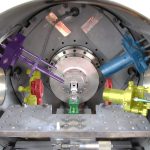Description
A colinear dispersion interferometer is an optical device that analyzes the interference pattern (“interferometer”) arising from two different wavelengths of light that each travel the same optical path (“colinear”) through a material. The interference pattern occurs because light’s propagation speed through material is dependent on the light’s wavelength (“dispersion”). This is a unique design from most interferometers that typically generate an interference pattern by splitting a single wavelength of light across two different optical paths.
Commonly, a dispersion interferometer sources at least one of the wavelengths from a laser. The other wavelength can either be sourced from another laser assuming the two lasers have relatively long coherence lengths, be slightly frequency shifted with a modulator assuming high temporal resolution isn’t needed, or can be generated by passing the first wavelength through a second-harmonic crystal. A correctly tuned second-harmonic crystal converts a portion of the input light into coherent frequency doubled (or wavelength halved) light.

After the two wavelengths pass through the probe material, for this dispersion interferometer design, an additional second-harmonic beam is generated that is polarized orthogonally to the original second-harmonic beam. The fundamental beam is then filtered out and the remaining two orthogonally polarized second-harmonic beams’ relative phase is analyzed.
References
[1] N. R. Hines et al., “Development of a colinear Second-Harmonic Orthogonal Polarization (SHOP) interferometer for electron areal density measurements in Magnetically Insulated Transmission Lines (MITLs),” Technical Report SAND2023-10581, October 2023, doi: https://doi.org/10.2172/2430189.
[2] N. R. Hines et al., “A fiber-coupled dispersion interferometer for density measurements of pulsed power transmission line electron sheaths on Sandia’s Z machine,” Review of Scientific Instruments, vol. 93, no. 11, p. 113505, November 2022, doi: https://doi.org/10.1063/5.0101687.
Presentations
- 2025-06 PPPS Abstract (SAND2025-01105A)
- 2024-10 APS DPP Presentation (SAND2024-13691C)
- 2024-08 ZFS Presentation (SAND2024-10383C)
- 2024-04 HTPD Poster (SAND2024-04738C)
- 2024-01 ZNetUS Presentation (SAND2024-00102C)
- 2023-10 APS DPP Presentation (SAND2023-13110C)
- 2023-05 ICOPS Poster (SAND2023-03920D)
- 2022-05 HTPD Poster (SAND2022-6339C)

